The U.S. Securities and Exchange Commission (SEC) has launched an all-out assault on cryptocurrency exchange Binance, requesting an immediate freeze of its U.S. assets.
The move comes just one day after U.S. regulators filed a lawsuit against Binance and its CEO Changpeng Zhao, accusing them of orchestrating a “web of deception,” and adding to the mounting pressure faced by the world’s largest cryptocurrency exchange.
The SEC requested the injunction against BAM Management US Holdings and BAM Trading Services, two units that the SEC believes were portrayed by Binance as independent but were secretly controlled by the parent business and Zhao.
The regulatory body stated in its motion to the federal court for the District of Columbia that it was seeking the freeze to ensure the safety of customer assets at the companies’ U.S. operations due to the companies’ “years of violative conduct, disregard of the laws of the United States, evasion of regulatory oversight, and open questions about various financial transfers and the custody and control of Customer Assets.”
“An order freezing BAM’s assets is necessary to preserve the status quo, prevent dissipation or transfer of those assets from the jurisdiction of this Court, and protect this Court’s ability to award relief in the form of disgorgement, prejudgment interest, and civil penalties,” read the commission’s proposed order for the judge to freeze assets.
Binance is filing an emergency blockchain transaction to shuffle all of the assets from Binance US before all of their assets are frozen.
— Bitfinex’ed 🔥🐧 Κασσάνδρα 🏺 (@Bitfinexed) June 6, 2023
Welcome to F’ Around And Find Out.
Coinbase TRO next? pic.twitter.com/6JMKAC7rHT
According to the initial complaint, Binance has demonstrated “blatant disregard for federal securities laws,” and the parent company and Zhao have “enriched themselves by billions of US dollars while putting investors’ assets at significant risk.” The SEC is requesting that Binance “disgorge all ill-gotten gains” and pay civil penalties but no amounts were specified.
Responding to the SEC’s filing, Binance.US sought to reassure its users that their assets would remain secure, and the platform would continue its normal deposit and withdrawal operations. The company vowed to vigorously defend itself in court, decrying the SEC’s action as unwarranted.
“The filing of the preliminary injunction is unwarranted and based more on the SEC Staff obtaining an advantage in litigation versus genuine concern about the safety of customer assets. Until recently – despite years of engagement – the SEC Staff has not expressed a concern about the safety of customer assets,” the company said in a tweet.
This afternoon, the SEC filed a motion seeking a TRO and preliminary injunction against https://t.co/AZwoBOgsqS attempting to, amongst other things, freeze https://t.co/AZwoBOgsqS corporate assets. User assets remain safe and secure and the platform continues to be fully…
— Binance.US 🇺🇸 (@BinanceUS) June 6, 2023
On Monday, the regulatory body claimed that Binance artificially inflated trading volumes, diverted customer funds, neglected to impose restrictions on U.S. customers, and deliberately misled investors about its market surveillance controls.
The commission’s suit triggered massive withdrawals from the crypto exchange platform.
Data from analytics firm Nansen reveals that investors have withdrawn approximately $790 million from the cryptocurrency exchange Binance and its U.S. affiliate Binance.US within a span of 24 hours.
Nansen’s data, as cited by Reuters, indicated that Binance experienced net outflows amounting to $778.6 million in crypto tokens based on the Ethereum blockchain, while Binance.US saw a withdrawal of $13 million.
Binance is also grappling with legal actions from other U.S. authorities, including the Commodity Futures Trading Commission (CFTC) and the Department of Justice.
Earlier Tuesday, the SEC filed a lawsuit against rival exchange Coinbase, alleging that it failed to comply with US securities registration rules. The moves taken against the two exchanges appear to be part of a broader government crackdown on the bitcoin industry.
The outcome of this high-stakes legal battle could have far-reaching implications for the cryptocurrency industry as a whole. As the SEC tightens its grip on the sector, investors and industry players alike are anxiously awaiting the court’s decision, which could shape the future of cryptocurrency regulation in the United States.
Information for this briefing was found via Yahoo Finance, Forbes, and the sources mentioned. The author has no securities or affiliations related to this organization. Not a recommendation to buy or sell. Always do additional research and consult a professional before purchasing a security. The author holds no licenses.









